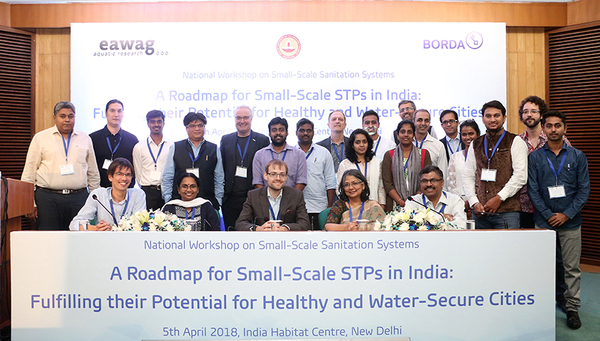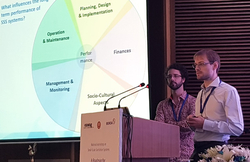Archive detail
A roadmap for small-scale sanitation to improve wastewater management in South Asia
April 27, 2018 |
Ever-expanding South Asian cities are facing enormous water and sanitation challenges, ranging from the supply of sufficient quantities and quality of water, the treatment of used water and sludge, to the protection of aquatic environments. For wastewater treatment alone, huge financial resources are needed to construct and operate the required infrastructure. Achieving the ambitious Sustainable Development Goal 6.3 target (halving the proportion of untreated wastewater by 2030) requires making well-thought-out investments with the available funds.
In order to achieve this goal, small-scale (often called decentralized) sanitation systems have a key role to play. The benefits of such systems, typically serving 10 to 1,000 households, have long been recognised. These systems allow for cost-effective local wastewater treatment and reuse, as well as stepped implementation. Small-scale systems are therefore increasingly considered as an alternative to conventional large-scale underground sewer networks and wastewater treatment plants.
The number of small-scale sanitation systems installed in South Asia is growing rapidly. An estimated 20,000 such systems have been built in India to date. However, a majority of these systems are underperforming owing to poor planning and weak monitoring systems, poorly trained personnel and the lack of recognition of small-scale sanitation as a potential solution. In some Indian cities this has recently made the headlines as new small-scale sanitation and water reuse policies faced the wrath of building owners and apartment associations, highlighting the need for pragmatic and evidence-based solutions.
Developing policy recommendations
The Bill and Melinda Gates Foundation-funded “Small-Scale Sanitation Scaling Up” (4S) project aims to develop policy recommendations to increase the success rate of small-scale sanitation systems and to ensure a well-managed, strategic scale-up process so they can fulfil their potential. In the workshops held in New Delhi and Kathmandu, Sandec scientists and their project partners presented the results of two years of field research in India, Nepal and Pakistan. The workshops provided a platform for discussing the prerequisites for a successful scale-up of small-scale sanitation systems in order to ensure public health, protect the environment, and provide safe water for reuse.


